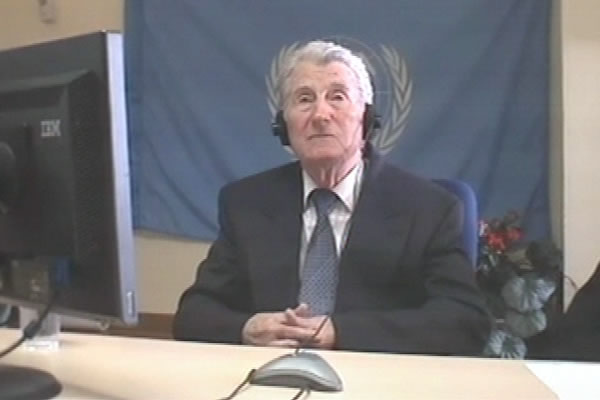Home
WHAT ARMY DIDN'T DO IN SANSKI MOST
In his evidence, retired colonel Branko Basara talked about disarming Muslims and Croats in the Sanski Most municipality and the VRS attacks on 'Muslim extremists'. Basara stressed that the army and he personally 'did not have any jurisdiction' over the prisons, the transportation to prison centers, evacuation of the population and the Crisis Staff decisions, including the imple-mentation of strategic goals
 Branko Basara, defence witness at Rako Mladic trial
Branko Basara, defence witness at Rako Mladic trial After a ten-day break, the trial of Ratko Mladic continued at full speed with the evidence of three witnesses. All witnesses testified via video link.
Andja Obradovic's written statement is under seal, and so are the contents of her testimony today. After Obradovic's statement was admitted into evidence, Borislav Vasiljevic from Kotor Varos was called to testify. In his written statement, Vasiljevic recounted how he was captured and tortured in May 1992 in the village of Vecici. Vasiljevic also mentioned the 'sufferings of the ethnic Serbs' and their 'fear that the genocide' against them in World War II would be reprised. The prosecution didn't have any questions for Obradovic and Vasiljevic.
The third witness to testify, retired colonel Branko Basara, was told at the beginning of his evidence that he did not have to answer any potentially incriminating questions unless the judges made him do so. Last year, an indictment was issued against Basara by the BH State Court for some of the crimes in Sanski Most. Ratko Mladic is also on trial for those crimes.
Basara retired from the JNA but re-activated his military service in October 1991 to take command over the 6th Krajina Brigade. In his statement to the defense, Basara said that his brigade was involved in disarming various paramilitary formations. Weapons were seized from Muslims and Croats in two stages, the witness explained. The villagers were first called to voluntarily surrender the weapons, and then the troops would enter villages and seize the remaining weapons. Basara argued that his soldiers were forced to fight in those places 'where the Muslim forces resisted'. Basara used the village of Mahala as an example: there, the women, children and the elderly were given some time to leave the village, they complied and were placed under the army's protection. The army then dealt with the 'Muslim extremists'.
The witness confirmed that some elements of his brigade were engaged in 'the peaceful takeover of power' in Kljuc. The military 'did not establish' the Krings and Betonirka prisons in Sanski Most, Basara claimed. In fact, neither the military nor Basara himself had any jurisdiction over those facilities. Basara was also adamant that the military did not have any role in the exodus of the population.
Although he attended the meetings of the Crisis Staff, Basara told the judges he didn't vote or take part in the decision-making process. In fact, he was there to make sure that the decisions were 'as normal as they could be', that the other side was not 'placed at risk' and that 'the rules of war were observed'.
Basara says that he did not refer to any of the Crisis Staff decisions in his orders; he always referred to the orders issued by the Corps command. The orders of the Crisis Staff were never sent to his brigade, Basara explained.
The incidents in Sanski Most that Mladic is indicted of were not discussed in the examination-in-chief. As alleged in the indictment, the campaign of persecution in that town reached the scale of genocide in 1992. The cross-examination that began as the hearing drew to a close will continue tomorrow.
Linked Reports
- Case : Mladic
- 2015-04-09 ‘SOLDIERS’ TALES’ ABOUT EXECUTIONS
- 2015-04-08 WHAT WITNESS DIDN’T SEE IN KONJEVIC POLJE
- 2015-04-07 PEOPLE FROM SREBRENICA ‘KILLED EACH OTHER’
- 2015-04-21 ‘COLLATERAL DAMAGE’ IN SANSKI MOST
- 2015-04-22 WITNESS'S ENCOUNTERS WITH MLADIC
- 2015-04-23 WHO IS RESPONSIBLE FOR BILJANI MASSACRE?
